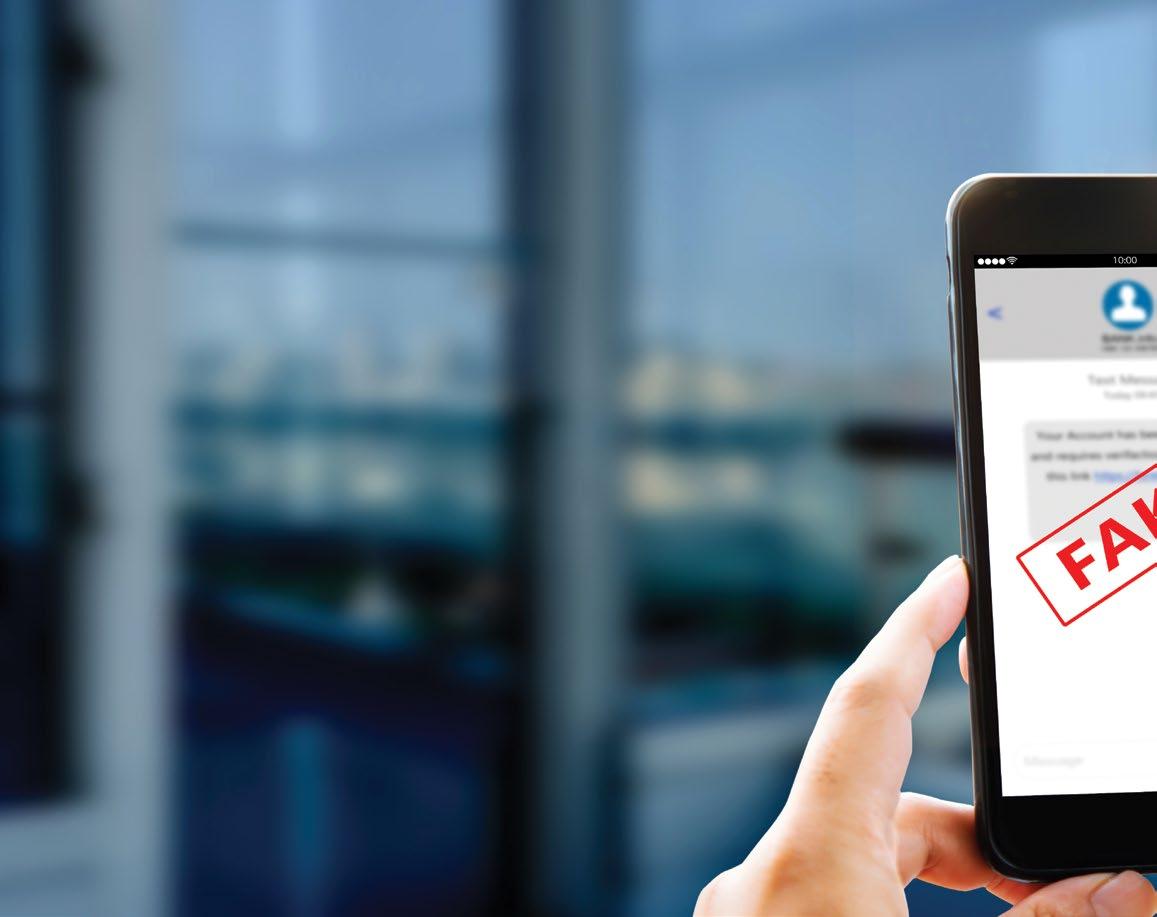
5 minute read
Protect Yourself from FRAUD SCAMS &
By Keith Loria
Earlier this year, an outside third party hacked into the Billiard Congress of America’s email server and, using a fake invoice that appeared to originate from a vendor, requested payment for unpaid invoices owed to actual vendors.
The emails instructed the BCA to wire payment for the invoices to a fraudulent bank account set up by the hacker(s). As a result, $25,806.23 was sent to the fraudulent bank account.
Additionally, the BCA was owed funds from another company via an invoice for $15,000. That company received an altered payment invoice and instructions that appeared to come from the BCA. Consequently, the business paid the funds to the threat actor instead of the BCA. When it was discovered that the invoices were fake and altered, the BCA was unable to recover the money it had wired to the fraudulent bank account.
The BCA’s commercial general liability insurance policy at the time did not cover any losses, as there was no claim or suit against the BCA, so there was nothing to investigate or analyze under the policy.
What the BCA went through is just one of many ways in which entities use fraudulent tactics to harm a business. So, how can you protect yourself from the rising number of unscrupulous individuals looking to cheat you out of your money?
While the billiard community often fosters trust and camaraderie, fraudsters can exploit this. Encouraging a culture of friendly skepticism and due diligence can go a long way in protecting businesses and enthusiasts in the industry.
Oliver Morrisey, an attorney who has seen his share of clients fall victim to scams, notes that many scams begin with an unexpected phone call, email, or text message enticing you with a deal that seems too good to be true.
“If you encounter this, always verify the identity of the sender or caller before acting,” he says. “Even if someone claims to represent a reputable entity like your bank or a government agency, take the time to contact them directly using official channels to confirm the legitimacy of their claims.”

C.L. Mike Schmidt, an attorney from Schmidt & Clark LLP, has handled many criminal cases involving fraud, and through this experience, he’s learned that spotting these schemes before they ensnare you is crucial.
“Scammers are becoming increasingly sophisticated, so it’s essential to be vigilant and informed,” he said.
One common type of fraud he’s encountered is phishing scams. These scams often come in the form of emails or text messages that appear to be from a legitimate company, asking for personal information or directing you to a fake website. The best way to avoid falling victim to this type of scam is to never click on links or download attachments from unsolicited emails or messages. Always verify the source before providing any personal information.
“Identity theft is a serious issue that can have long-lasting effects,” Schmidt says. “This occurs when someone uses your personal information, like your Social Security number or credit card information, without your permission to commit fraud or other crimes. To protect yourself, it’s very important to regularly monitor your financial accounts for any suspicious activity and to be cautious about whom you share your personal information with.”
Scammers often employ high-pressure tactics that prompt individuals to act quickly without thinking. For example, emails that urge immediate action regarding an account issue or prize winnings typically carry a hidden agenda. If this happens, take the time to assess the situation thoroughly. If you’re feeling unsure, consult with a trusted friend or family member before proceeding.
Chris Yang, a personal finance consultant with extensive experience in financial security and consumer protection, advises retailers in the billiard industry to implement robust verification processes for online transactions, especially for high-value items like custom pool tables or rare cue sticks. This includes verifying the customer’s identity, using secure payment gateways, and being wary of unusual requests or overpayments.
TIPS FOR RETAILERS:
1 Retailers should implement multi-factor authentication, use secure payment gateways, and regularly update their cybersecurity measures. They should also educate themselves and their staff about the latest fraud techniques.
2 Implement a robust Know Your Customer (KYC) process. This can include verifying email addresses phone numbers, and requiring government-issued ID for high-value transactions.
3 Payment systems should use AI-driven fraud detection that flags suspicious patterns. They should also have real-time monitoring and the ability to halt transactions instantly if fraud is suspected.
4 Retailers must use end-toend encryption, maintain up-to-date SSL certificates, and adhere to PCI DSS standards.
Regular security audits and penetration testing are crucial.
5 Train staff to spot inconsistencies in customer behavior, recognize signs of stolen credit cards, and understand phishing tactics. Regular workshops and simulated fraud scenarios can be effective training tools.
6 Partnering with reputable payment processors like PayPal or Stripe can provide additional layers of security. Fraud detection services like Sift or Signifyd can also be valuable for real-time transaction monitoring.
7 Develop and enforce strict data protection policies that outline how customer data is collected, stored, and used. Limit access to sensitive data to authorized personnel only.
“Consumers should thoroughly research sellers before making any online purchase,” he says. “Look for reviews, check physical addresses, and verify contact information. Be particularly cautious of deals that seem too good to be true, such as vintage billiard equipment at suspiciously low prices.”
In one case, a client of Yang’s nearly fell victim to a scam involving a supposedly rare antique pool cue. The scammer had created a convincing backstory and fake provenance documents. The client avoided losing thousands of dollars by cross-referencing with reputable collectors and insisting on an in-person inspection.
Retailer Protection Against Online Threats
Kevin Shahnazari, founder and CEO of FinlyWealth, offers several ways that billiard retailers can protect themselves online.
It starts with robust verification.
“Implement multi-factor authentication for online accounts and transactions,” Shahnazari says. “This could include SMS codes, email confirmations, or even biometric authentication for high-value transactions.”
Employee training is also important.
“Regularly train staff to identify phishing emails, suspicious links, and unusual requests for information,” he says. “Encourage a culture of skepticism and double-checking.”
Be sure to partner with reputable payment processors that offer fraud detection tools and chargeback protection, and keep a close eye on social media, review sites, and online forums for mentions of your business that could be part of a scam or misinformation campaign.
A great way for detecting fraudulent transactions is by using real-time monitoring.
“Implement a payment processing system that monitors transactions in real time, looking for anomalies like unusual purchase amounts, multiple transactions from the same card in a short period, or transactions from high-risk countries,” Shahnazari says. “Set limits on the number of transactions allowed from a single card within a certain timeframe.”
Utilizing machine learning algorithms that can identify patterns and trends in fraudulent transactions can also help to detect and prevent future fraud.

8 Schedule audits. Conduct regular security audits, ideally quarterly or semi-annually, to assess the effectiveness of your security measures and identify areas for improvement.
9 Engage cybersecurity consultants to assess your security posture and recommend improvements.
10 Security protocols should be reviewed quarterly at a minimum. This includes updating software, reassessing risk factors, and adapting to new fraud tactics in the billiard industry.
By implementing these comprehensive measures, billiard retailers can significantly enhance their ability to detect and prevent fraud, safeguarding their businesses and their customers from financial harm. You can also check out information on some of the latest scams at the Better Business Bureau’s dedicated page at www.bbb.org/scamtracker.

